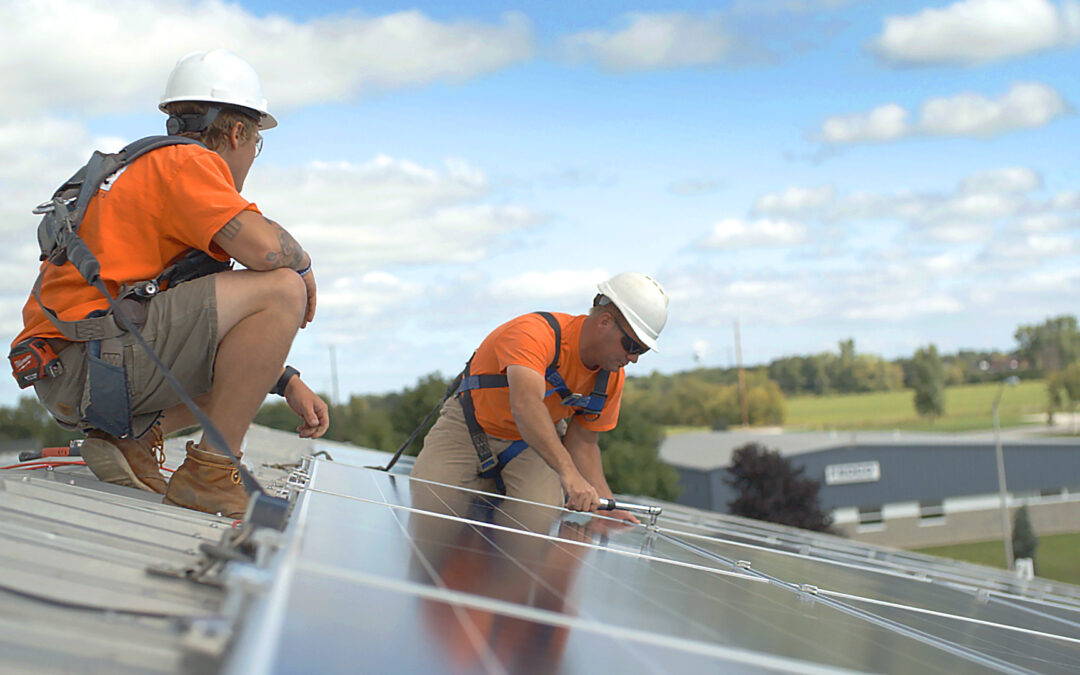
by Heather Allen | Oct 19, 2021 | Advocacy, Electric Vehicles, Jobs, Renewables, Solar
Thirty-one Wisconsin businesses signed a letter supporting ambitious clean energy investments and broad interest in the American Jobs Plan. The signatories, representing higher education institutions, local governments, and biogas, solar, finance, and electric vehicle industries, are committed to “advancing the clean energy economy, building family-sustaining jobs, and expanding economic opportunities for Wisconsinites.”
The letter states, “Wisconsin’s cumulative solar capacity more than doubled in the past year and is anticipated to quintuple in the next 3-5 years. Wisconsin’s clean energy workforce is 76,000 strong, and solar and advanced transportation jobs proved remarkably resilient even during the economic upheaval of 2020.” Investing in these sectors can create jobs and opportunities for Wisconsin to become a clean energy leader in the Midwest.
The electric vehicle sector is a key focus of the American Jobs Plan and an area where Wisconsin has tremendous opportunity to invest. Recent studies and RENEW’s analysis suggest that the federal stimulus funds spent on transportation electrification will yield a 500% return on investment.
Corry Bullis of U.S. FLO said that “Given President Biden’s goal to deploy 500,000 charging stations by 2030, FLO is expanding its manufacturing footprint to meet increasing demand in the U.S and support its climate and air quality goals. Incentives, as outlined by the American Jobs Plan, will be critical to delivering on this promise. We urge Congress to pass an infrastructure package as soon as possible.”
Wisconsin’s solar job market held steady throughout the pandemic. The industry continues to advance, and local job opportunities are growing rapidly, signaling clean energy investments are a bipartisan solution to growing Wisconsin’s economy and advancing careers for local workers.
Ed Zinthefer, an owner of Arch Electric based in Plymouth, WI, says, “More homeowners and businesses are saving money and supporting local jobs in their neighborhoods by going solar. We are busier than ever, growing and hiring and building more clean energy projects. It’s a great time to get into clean energy in Wisconsin.”
Even as the renewable energy markets are growing, there is an urgent need to drive investment and expand our workforce. According to the Solar Energy Industry Association, the solar industry is on a trajectory to reach 400,000 solar jobs by 2030. However, employment will need to exceed 900,000 workers by 2035 to reach President Biden’s 100% clean electricity goal.
Sign your name to support federal investment in clean jobs here in Wisconsin!
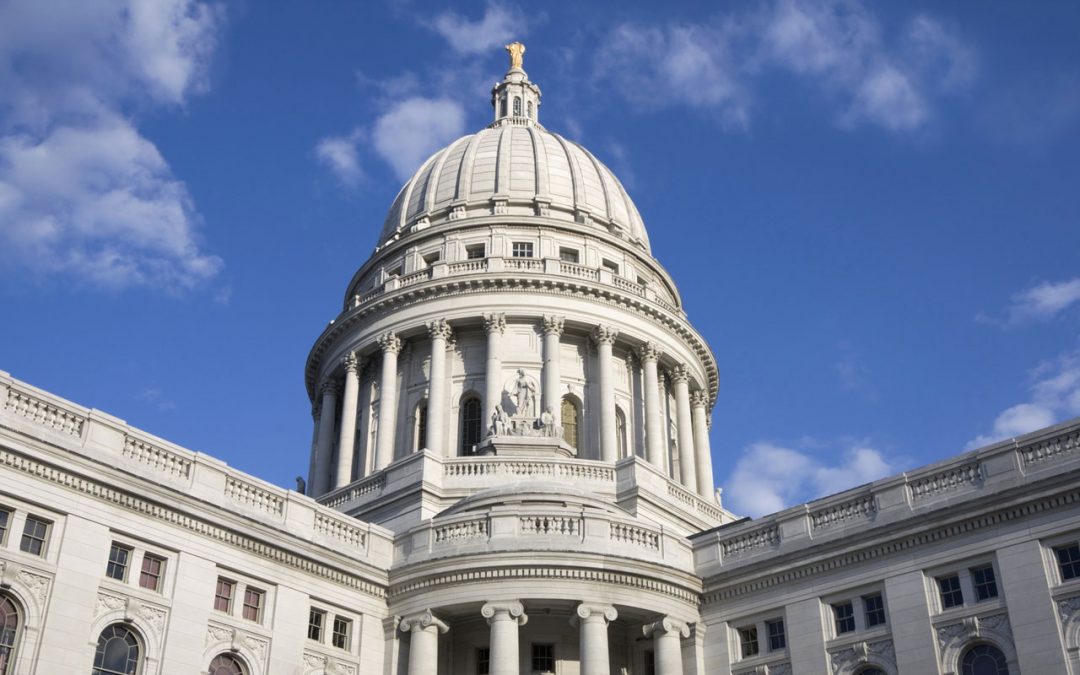
by Jim Boullion | Aug 21, 2021 | Action Alert, Advocacy, Electric Vehicles, Legislative Watchlist
The Senate Committee on Government Operations, Legal Review, and Consumer Protection scheduled a public hearing on Senate Bill 462 / Assembly Bill 439 relating to ownership, control, or operation of a motor vehicle dealership and performance of motor vehicle warranty service.
Wednesday, August 25, 2021, 10:00 AM
Room 411 South, State Capitol
Senator Dale Kooyenga (R-Brookfield) and Representative Adam Neylon (R-Pewaukee) introduced legislation to allow a direct sales business model for electric vehicles (EVs) in Wisconsin. If passed, EV manufacturers could sell and deliver their vehicles directly to consumers, either online or from a manufacturer-owned dealership, rather than Wisconsin’s current dealership model. The bill would also clarify that an EV manufacturer can provide warranty and preparation work on vehicles they manufacture in Wisconsin.
RENEW Wisconsin strongly supports this initiative and sent a letter to legislators urging their endorsement. To help pass this legislation, we encourage you to contact your legislators directly or attend the public hearing to register in favor, or even better, speak directly with the committee members.
The Kooyenga/Neylon bill is one of the keys to increasing EV availability for Wisconsin businesses and consumers and reducing transportation-related greenhouse gas emissions. The internet has completely reimagined how we buy things, opening opportunities, lowering prices, and eliminating many market barriers of the past. The bill would permit Wisconsin’s consumers greater access to EVs that better suit their financial and driving needs by allowing them to purchase directly from the manufacturer-dealership without traveling to Illinois or Minnesota.
If you have any questions or would like to report whether or not your legislators support this legislation, please contact Jim Boullion, Director of Government Affairs at jim@renewwisconsin.org or Jeremy Orr, Emerging Technologies Program Manager at jeremy@renewwisconsin.org.
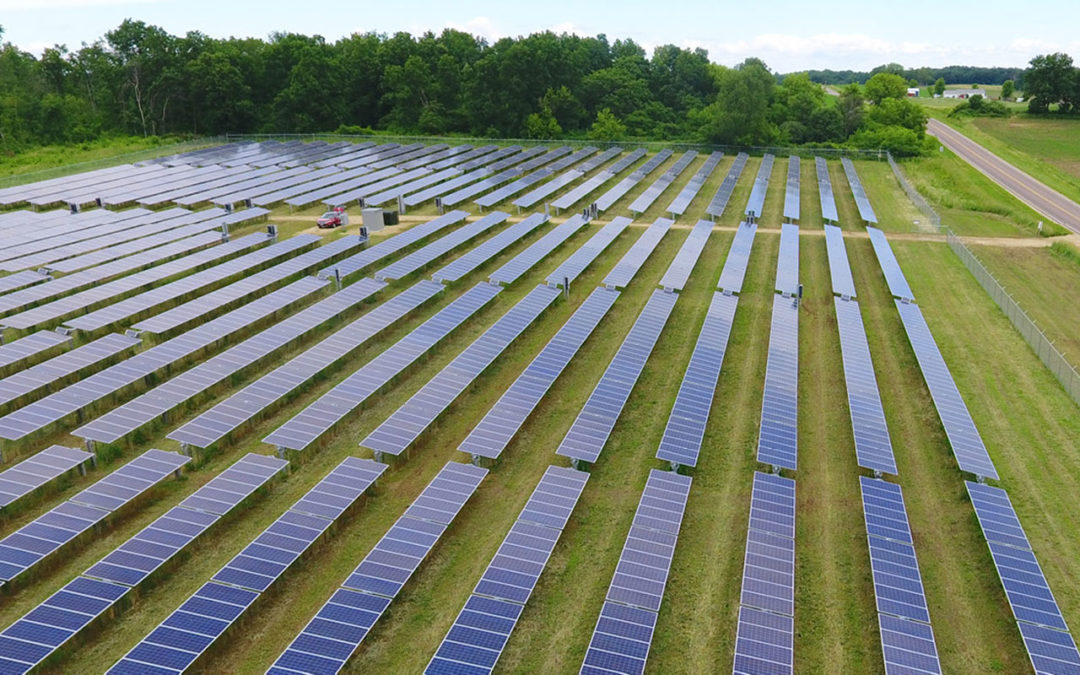
by Katelynn Samuelsen | Jul 23, 2021 | Advocacy, Community, Community Solar, Legislative Watchlist, Policy, Renewables, Solar, Utilities
This blog is from 2021 and does not reflect the 2023 iteration of the Community Solar Bill. For information on the current iteration check here.
Over the past few months, RENEW Wisconsin and our partners have been developing statewide policies that would expand customer access to community solar projects. The National Renewable Energy Laboratory defines community solar, also known as shared solar or solar gardens, as a distributed solar energy deployment model that allows customers to buy or lease part of a larger, offsite shared solar photovoltaic (PV) system. Community members subscribing to a solar facility receive credits for their share of the power produced, either in electricity bill savings or energy (kWh) credits.
New community solar projects are being rapidly developed around the country; 21 states, including Minnesota and Illinois, have already enacted policies that expand the community solar market between subscribing organizations and participating customers. Community solar deployment in the United States has achieved a five-year annual growth rate of 53%[1]. But, lacking statewide policies to promote community solar options, Wisconsin is quickly falling behind.
Since 2010, the number of solar energy systems purchased by US homeowners and businesses has grown tenfold. By the end of 2019, nearly two million homeowners and businesses were reaping the rewards from producing solar-generated electricity. Solar power is popular with many US consumers, and it has become an affordable option for many households and businesses. Yet access to solar power is limited. More than 50% of Wisconsin households cannot access solar energy onsite because they rent, live in multi-tenant buildings, have roofs that cannot host a solar system, or experience some other constraining factor.
In Wisconsin right now, only regulated utilities and cooperatives can provide energy from solar gardens to customers. A few utilities, like Madison Gas and Electric, offer a shared solar service that customers can enroll in today. However, most Wisconsin utilities do not currently have a comparable program available for their customers. That lack of access will persist unless state lawmakers adopt a modernized policy to promote a robust community solar marketplace.
Senator Duey Stroebel (R – Saukville) and Representative Timothy Ramthun (R – Campbellsport) have introduced legislation that would expand access to community solar in Wisconsin. This legislation enables the development of more community solar and supports energy freedom, expands customer choice, saves money on your utility bill, all while creating healthier and more resilient communities.
With a stronger statewide community solar policy, we would open the door for homeowners, businesses, schools, churches, and nonprofits to supply themselves with clean, affordable electricity from a local solar array.
Community solar legislation would benefit all utility customers by adding locally generated electricity to our energy grid while strengthening the rural economy at the same time. Community solar brings guaranteed savings for every subscriber as well as predictable and stable long-term energy costs. It gives customers a choice to support local clean energy projects while expanding access to affordable renewable energy for low-to middle-income residents.
Community solar expansion would allow more Wisconsin farmers to lease their land to host solar arrays and receive a guaranteed secure income for 25 years or longer. This drought-resistant cash crop is especially valuable for Wisconsin’s agricultural communities facing economic stress.
The soil underneath the panels can be planted with a variety of native plants and perennials. In addition to minimizing agricultural runoff and fixing nutrients in the soil, these perennials create a high-quality habitat for bees, butterflies, and other insects that move pollen in and around the fields and improve farm productivity.
When solar panels have reached the end of their useful lives, the equipment can be removed, and crop production can resume on the land that has become more fertile as a result of the native plantings.
A robust community solar market in Wisconsin will create thousands of jobs, spur hundreds of millions of dollars in economic growth, and save customers millions in utility bills. Community solar is proven to support economic development, expand consumer choice and bring clean energy to urban and rural communities across Wisconsin.
Learn more about the proposed community solar legislation at www.wisolarcoalition.com.
[1] The Vision of US Community Solar: A Roadmap to 2030

by Jim Boullion | Jul 15, 2021 | Advocacy, Community Solar, Electric Vehicles, Legislative Watchlist, Policy, Renewables, Solar, Utilities
When Governor Tony Evers introduced his 2021-23 Budget Bill in February, it included 28 provisions to advance clean energy and energy efficiency in Wisconsin. Among those provisions were recommendations to expand Focus on Energy, invest in the clean energy workforce, and support Wisconsin’s electric vehicle infrastructure.
Unfortunately, by the time the Governor signed the Budget on Thursday, July 8th, those 28 provisions, along with a majority of the Governor’s other initiatives, were removed from the Budget document adopted by the Joint Finance Committee (JFC) and legislature.
A number of the provisions and other clean energy bills may still be considered during the remainder of the upcoming regular legislative session. Among the proposals we expect to be considered include:
- Community Solar Expansion – Authorize the development of non-utility-owned community solar projects. Would direct the PSC to establish fair credit rates for subscribers and compensation to utilities for the use of their infrastructure and billing services. (Introduced for co-sponsorship on July 14th)
- 3rd Party Financing – Affirm 3rd party financing of solar arrays is legal.
- Direct Purchase of Automobiles – Enable electric vehicle manufacturers to sell vehicles directly to consumers in Wisconsin, either online or at manufacturer-owned facilities, without going through an independent dealership.
- EV Charging Station Grants – Allocate up to $10 million of the unspent VW Settlement funds for clean energy corridor incentives for EV charging stations.
- EV Charging Fees – Clarify selling electricity by the kilowatt-hour to EVs does not subject EV charging station owners to utility regulation.
RENEW Wisconsin will continue to work with the legislature and the Governor to advance these and other clean energy initiatives. We hope you will join us.
If you would like to talk to your legislators about any of these provisions or have other clean energy ideas that you think the State should adopt, click here to find your representatives’ contact information.
If you have any questions or comments about any of these issues, please contact Jim Boullion, RENEW Wisconsin’s Director of Government Affairs, at jim@renewwisconsin.org.
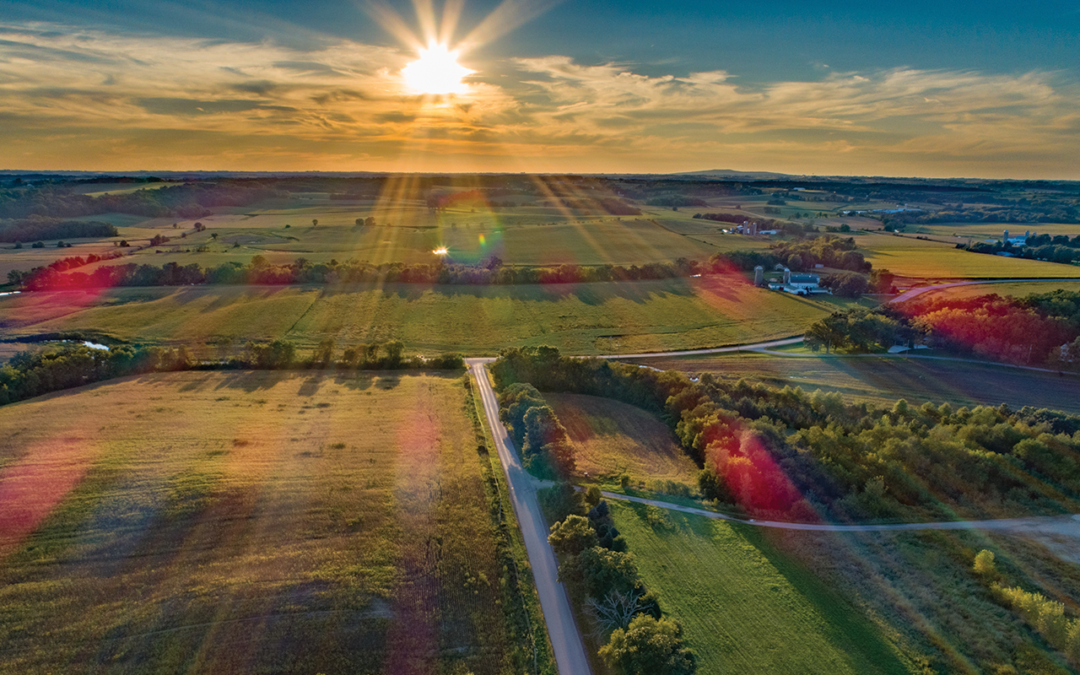
by Heather Allen | Jun 22, 2021 | Action Alert, Advocacy, Energy Storage, PSC Priorities, Public Service Commission, Solar, Utility Scale
The proposed Koshkonong Solar Energy Center would be located in southeast Dane County upstream of the Rock River. The centerpiece would be a 300-megawatt solar power generation facility anticipated to begin producing energy in 2024. Koshkonong Solar will also include a 165-megawatt battery storage component to help bolster grid reliability.
As Wisconsin continues to retire coal-fired power plants it is vital to replace those fossil fuel electricity generators with emission-free renewable energy. For example, the Columbia Energy Center, located just south of Portage, is now slated for a 2024 retirement.
Koshkonong Solar Energy Center needs vocal public support to get approved and help shift Wisconsin to clean energy. Voice your support for local solar energy by submitting a short comment today to the Public Service Commission (PSC) of Wisconsin.
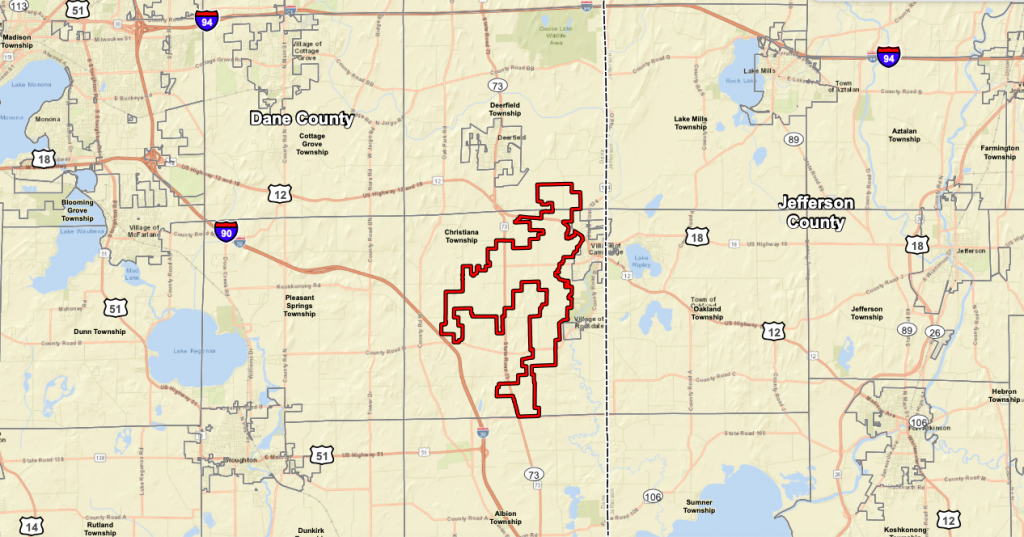
Project to be located in southeast Dane County
Koshkonong Solar would advance the clean energy goals of Dane County, its local municipalities, and residents, and the State of Wisconsin. Koshkonong Solar will generate enough emissions-free electricity to power 60,000 average American homes or just about ¼ of the 240,000 households in Dane County. The project also represents exactly ¼ of the amount of solar capacity Dane County called for in its Climate Action Plan. This single project would also bring an estimated $200 million of investment including lease payments to local landowners and new revenue streams to local governments. Local governments in the project area will receive $1.2 million per year for the life of the project based on Wisconsin’s utility aid fund formula.
The developer for this project is Invenergy, which has successfully permitted other large solar farms in Wisconsin (Badger Hollow, Paris). Koshkonong, like Invenergy’s other projects, is slated to be acquired by Wisconsin utilities, including Madison Gas and Electric.
Air Quality and Carbon Emission Reduction Benefits
Koshkonong Solar will reduce CO2 emissions by between 15 and 20 million tons over its 30-year life, along with reductions in other forms of air pollution such as 12,000 tons of nitrogen oxides (NOx), 12,000 tons of sulfur dioxide (SO2), and 804 tons of particulate matter (PM2.5).
Click here for the Koshkonong Emissions Analysis.
The emissions reductions from the estimated 600,000 megawatt-hours of energy production for the project are equivalent to the carbon sequestered by 7 million tree seedlings grown for 10 years, or the avoided CO2 emissions from 2,345 railcars worth of coal burned. See other comparisons at the EPA greenhouse gas equivalency calculator.
Soil Retention and Water Quality Benefits
Koshkonong Solar will establish deep-rooted prairie vegetation amidst the arrays. This type of vegetation will increase infiltration of the site compared with current agricultural usage by (+2.2%), reduce stormwater runoff (-60% for a 1-year 24-hour rainfall event), nitrogen outflow (-48%), phosphorus outflow (-53%), and Total Suspended Solids outflow (-87%).
These upstream water quality improvements would have a positive impact on downstream environments, and yield material benefits for watershed ecosystems, human health, and recreation. Furthermore, the prairie vegetation will help turn atmospheric carbon into organic carbon, which will be deposited and build up the soil for future agriculture. Koshkonong Solar, like other solar farms, can be returned to agricultural use after the project is completed and equipment is removed, see our solar farm FAQ to learn more.
The Public Service Commission of Wisconsin is currently reviewing the project. We are asking supporters of clean energy, conservation, and climate action to submit comments sharing their support for the project. Your support would be greatly appreciated. Your voice is crucial to move the project forward and advance the clean energy transition in Wisconsin.
Submitting a message of support is easy, simply click on the link below, fill out the form, and click ‘file’. The last day to submit letters of support is July 3rd.
Click here to submit a comment in support of Koshkonong Solar!
Weighing in today will have a tremendous impact on Wisconsin’s ability to transition to clean emission-free renewable energy! Your voice matters!
Interested in learning more?
Find answers to frequently asked questions about solar farms here.
How much agricultural land would it take to power our state with solar energy? RENEW has calculated that it would take less than half a percent of Wisconsin’s total land to supply half our state’s electricity from solar. This is approximately the same amount that is currently in Wisconsin’s Conservation Reserve Program.
RENEW’s factsheet solar and agricultural land use.
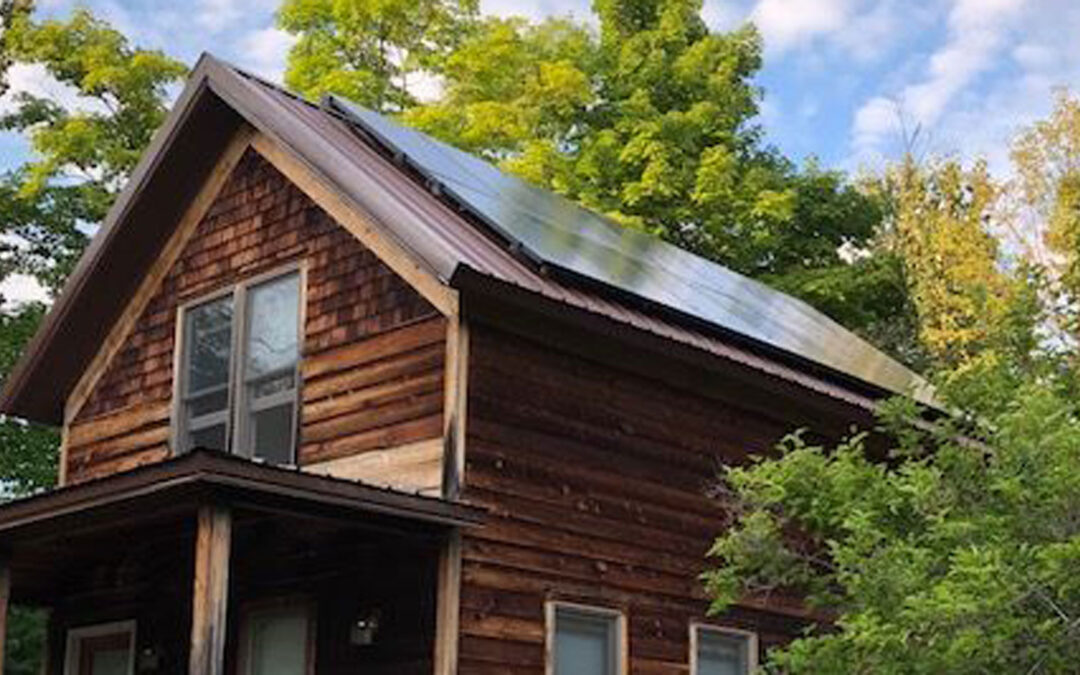
by Heather Allen | Jan 28, 2021 | Advocacy, Community, Policy, PSC Priorities, Public Service Commission, RENEW Wisconsin, Renewables, Solar
COAUTHORS: Michael Vickerman and Lauren Reeg
Wisconsin’s distributed generation (DG) renewable energy market lags behind comparable states.[1] As seen in other states, DG helps diverse groups of individuals and organizations, including businesses, residents, renewable energy customers, and future renewable energy customers, gain access to renewable energy and create a more fair and navigable market.
Whether it takes the form of behind-the-meter generators powering individual customers or larger projects feeding power directly into the distribution grid, DG is a vitally important segment of the renewable energy landscape. Customer investments drive these installations with benefits extending to Wisconsin businesses, residences, governments, nonprofits, and their communities. DG clean energy investments help spur local economic investment, support clean energy jobs, and save Wisconsin money that otherwise would have been spent on importing fossil fuels.
It has long been RENEW’s view that a more fair, clear, and consistent regulatory environment could strengthen the DG market and accelerate the transition to renewable energy in Wisconsin.
In June 2020 the Public Service Commission of Wisconsin (PSC) convened an investigative docket” (5-EI-157) to identify regulatory barriers that effectively put a tight lid on Wisconsin’s DG market, especially customer-sited DG.
This investigation is structured to encourage input and recommendations from organizations and entities that support small-scale DG. RENEW has assembled an expert legal and technical team for this docket—Tim Lindl and Melissa Birchard of Keyes and Fox, and Justin Barnes of EQ Research. We invite you to review the legal and policy analysis we provided to the PSC in August 2020 and in January 2021.[2] A coalition of organizations (Clean Energy Advocates) joined our comments to the PSC, demonstrating broad support for an improved DG market. This ongoing investigation is the best opportunity we’ve had in more than 10 years to advance renewably powered DG before the PSC.
The success of this campaign will strengthen and expand the renewable DG market in Wisconsin. If you support this work, please consider a donation to RENEW today. Together we can champion renewable energy growth in Wisconsin and we are poised to make significant progress in 2021. Join us today!
Wisconsin has fewer net metering customers than comparable states
Net metering customers represent an important segment of the renewable energy market, however, Wisconsin is falling behind. In the last four years, net metered customers in Wisconsin have grown by only 0.11%, well below the increases seen elsewhere in other states since 2015.
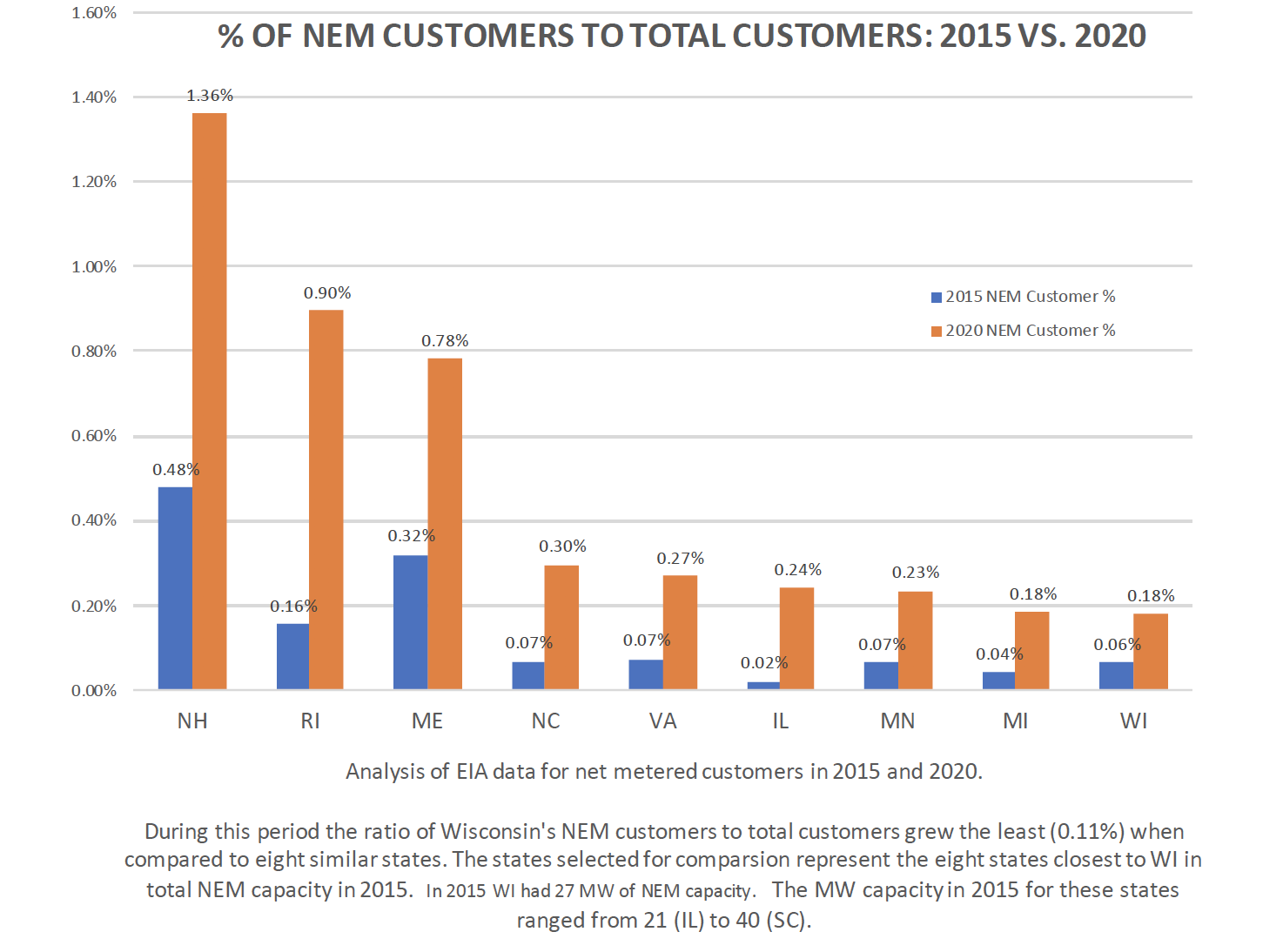
Fair and clear distributed generation policies would grow the renewable energy market in Wisconsin
RENEW Wisconsin aims to enlarge the market share for non-utility-owned renewable DG, including both self-supply and grid-supply projects. In furtherance of that goal, we’ve developed a number of principles that should inform decisions rendered in the DG docket. These include:
- Ensuring developer access to standard offer contracts that have terms for reasonable compensation.
- Giving developers insight into system and utility resource needs to help them target their planned investments.
- Provide larger energy users with better and less restrictive opportunities for larger self-supply resources.
- Standardize and improve net metering rates for all customers across Investor-owned Utilities (IOUs).
In addition to behind-the-meter systems, RENEW has also set forth a path for front-of-meter renewable generation projects up to 20MW. These types of projects should be eligible for 20-year standard offer contracts that are pegged to the same methodologies that utilities use when assigning value to their own generation projects. Leveling the playing field for compensating solar is essential to increasing customer investment opportunities, and expanding the solar workforce.
RENEW is optimistic that by the end of the docket the PSC will land on several beneficial policy changes for promoting renewable DG. These policy changes could be taken up later this year through the anticipated utility rate case filings. Should events unfold along these lines, solar developers and customers stand ready to benefit from a more fair, clear, and consistent renewable energy market.
Join RENEW’s campaign to advance renewable distributed generation in Wisconsin
Since 1991, RENEW has been the state’s preeminent advocate for renewable energy. At the macro scale, solar and wind can outcompete fossil fuels on cost and environmental performance. For the first time in more than a decade, we have an opportunity in Wisconsin to broaden the clean energy transition underway to benefit all customers who place a value in a healthy energy economy. A clear, fair and forward-looking regulatory environment will be crucial to spreading renewable energy across all sectors of society. RENEW is bringing together the leadership and expertise necessary to undo the regulatory barriers that have held renewable DG back, and to replace them with policies to make renewable DG more accessible, affordable, and plentiful across Wisconsin. We hope you will join us in this work by donating today. 2021 promises to be an exciting year!
[1] RENEW evaluated eight states closest to Wisconsin in terms of cumulative Net Energy Metering (NEM) capacity at the end of 2015, i.e., the four states immediately above and below Wisconsin in EIA data listing NEM capacity by state. The eight states closest to WI in NEM capacity in 2015 included NH, RI, ME, NC, VA, IL, MN, and MI. The 2020 data is based on NEM capacity through April 2020. The percentage of total customers uses 2018 total state customer counts for both calculations. Note that Wisconsin has fallen behind states it had previously led. See bar graph for more information.
[2] In the most recent comments filed by Clean Energy Advocates, we looked at this year’s PSC calendar to assess how our recommended actions can make their way into regulatory policy. The DG docket now underway is well-timed in that we expect every Class A investor-owned utility in Wisconsin to file for new rates in 2021.







